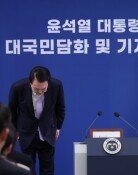Silent Energy War Between China and Japan
Silent Energy War Between China and Japan
Posted October. 12, 2003 22:46,
Kawaguchi Yoriko, Minister of Foreign Affairs of Japan, visited Russia in June quickly. She visited Vladivostok in the far eastern area of the country rather than Moscow, and met Economic Deputy Minister Viktor Khristenko instead of Igor S. Ivanov, Russian Minister of Foreign Affairs.
Kawaguchi suggested a surprising offer, saying, If Russia chooses the far-eastern line as the way through which the oil pipes from Siberia go, for Japans benefit, Japan would provide $5 billion for the development of the oil fields and the construction of the pipe lines.
Kawaguchis offer was stimulated by Chinas one, suggested by Chinas leader Hu Jintao in Moscow this May, that it would offer support of $17 billion for the direction of the lines for Chinas benefit, although it was even bigger this time.
Initially, the Siberian pipe lines were planned by China and expected to start the oil flow by 2005. But after Japans recent proposal, things became messy. Even the direction of the lines is not decided yet.
Russia, in a strong position due to the two countries aggressive courtship, suggested an alternative plan compromising the two countries offers, but this is not an easy solution. This is because keeping the oil field all to oneself is much more attractive than sharing it due to the finite oil reserves.
China now depends upon about 80 percent of its oil imports from the Middle-East and Africa. Japan also depends upon approximately 80 percent of its oil imports from the Middle- East, therefore Siberias oil reserve is an oasis to both of the countries.
The competition for the energy between the Northeast Asian countries is so fierce that it can be called a silent war for the energy.
On October 7 in Vladivostok, a seminar for the international cooperation between the Northeast Asian countries in securing the stable energy sources was held. Officials from businesses, including the worlds biggest gas producer Gazprom of Russia, major energy company Royal Dutch Shell, BP (British Petroleum), Korea Gas Corporation (KGC), and academic institutions met together.
Kim Myung-nam, the director of KGCs foreign bureau, said, The conflicts between the Northeast Asian countries are the confusion of the cooperation in energy. Lee Sang-gon, the head of the Institute for the Research of Energy Economics, suggested resolving the quarrel about the leadership in energy development, saying, Energy cooperation in Northeast Asia is indispensable.
International majors are joining the race for the Russian energy market. Exxon-Mobil is trying to acquire 40-50 percent of shares of Yukos, Russias biggest oil company. Experts said, Because Yukos already took over Sibneft, Russias 4th largest oil company, in the first half of this year, if Exxon-Mobil succeeds in the acquisition, it would be able to secure the throne of the energy industry. Earlier, BP took over THK, Russias 3rd biggest oil company, resulting in BP-THK.
BP-THK is the major shareholder of the Rossia Petroleum (RP), the managing company of the Kovykta gas reserve development plan which Korea is pushing forward with Russia and China. Yukos is the managing company of the Siberian oil fields which China and Japan are competing to get.
If Japans wish comes true, that is, the pipe lines from Siberia to Nakhodka in the far eastern Asia area, Korea would be able to expect to import oil from Siberia. Therefore now its absolutely wrong that Korea is out of the picture when the international majors compete fiercely around Russia.
Ki-Hyun Kim kimkihy@donga.com







